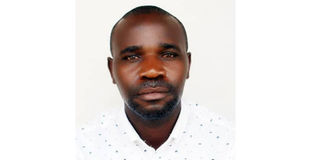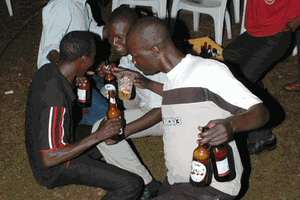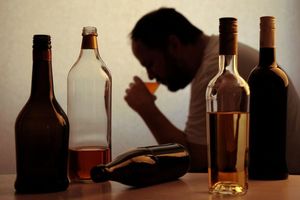
Dr Nesterio Mubangizi
On the morning of July 24, 2023, at about 10:30 am, my two sisters and I left our village home in Kabale District headed to Fort Portal City. Our elder brother was driving just a few minutes ahead of us and his wife, sister and nephew were in his car.
I remember wishing our elderly mother a goodbye as she stood in the yard, bidding farewell to her children unsure of when she would see them again. Two days earlier, we had held the first memorial service for our late father; a Mass celebrated at our home. Our mother had not gotten used to widowhood even after two years. There was still an air of somberness on her face.
She looked at us in such a way, as if telling us, “Anytime soon, I might join your late father and none of you will be here with me.” However, none of us knew who death would choose to steal first.
I started the car and drove towards Kabale Town, which is about 13 kilometres from our village home. In the car, I had loaded five empty crates of beer, which I was returning to a beer depot I had got them from the previous Saturday. We offloaded the crates and I lifted them to the shop. Somehow, I placed my phone charger on her table and because I was in a hurry, I left it there.
About three kilometres later, I recalled leaving my charger behind. (How I wish I had not). I parked by the roadside and called a young man to get my charger and deliver it to me. I also asked him to ask the beer seller to give him waragi worth Shs2,000 to bring for me. In about 12 minutes, the charger and the waragi, which was slightly above the half mark of a small Rwenzori water bottle were delivered. I paid the kind man and off we went.
Straightaway, I wanted to know if the waragi was good. So, I dropped three or so drops on my tongue. It felt amazing burning as it descended my throat. Another three drops later, I realised we had arrived in Kabale Town. I was still sober and so, I thought I could take a little bit more; one for the road as they say.
By this time, our brother had moved far ahead. Yet, since I was driving a posh new Harrier with great tyres, I knew all it would take would be me pressing my foot a little firmly on the accelerator before I caught up with him, certainly before Mbarara City. So, I took another sip of my waragi and I accelerated.
The last I remembered is arriving at Rwahi Trading Centre in Ntungamo District. I felt happy and for some reason, I was speaking more English than I usually do. I pulled by the roadside at Rwahi and picked up a passenger who was headed to Mbarara City just to make some extra money.
Impaired memory
As he entered the car, I took another somewhat generous swallow from the bottle and raced off. By this time, my head was beginning to understand ahead of time. I could read the road signs before reaching them and negotiate corners so well before time. I thought I was being brilliant. Gradually, the road lanes grew a little smaller and more often, I would find myself driving on the edges or in the middle of the road.
I remember faintly the arguments from my passengers when I narrowly edged off a trailer that I nearly smashed my vehicle into while overtaking in the wrong place. Everyone held their breath and said their prayers. After this narrow escape, they all started rebuking me, saying I was the worst driver even as I replied that I was good to continue with the journey. I even emphasised how skillfully I had avoided the trailer.
In Ntungamo Town, I sped through the humps, mounting over them like my car was a chopper. Unfortunately, many kilometres after Ntungamo, I drove out of my lane. I was driving on the other side when a larger trailer came head-on. I felt like the other driver was stupid. How could he not see he was meeting me head-on?
The people in the back seats shouted. They cried out loud, urging me to get off. I was a little sleepy. I did not know how to get away from the ghastly multi-tyred heavy long monster that was heading for us at a speed. It was so close, so ruthless that I closed my eyes. We would be meeting our father first.
In that moment, all I can say is that God saved us. I swear, I do not remember who swerved the car. The trailer missed us by a whisker, only knocking the side mirror.
I was urged to pull over by the roadside. My passengers looked up into the skies and thanked God, their hands lifted. They urged me to stop driving. On my part, although I was shivering, I felt sober and very okay to continue with the journey. It seemed like an exaggeration of a trivial affair.
When I insisted on driving further, they fought me with sharp words, which had no harm on me. We exchanged some brutal words but still, I refused to let go of my steering. At that point, I retorted: "I will leave you all if you refuse to get into the car." And I started the car.
Somehow, I remembered that I had changed lanes before parking there. My tired head failed to fathom whether I had just changed lanes or changed direction.
In the end, the power of waragi won. My judgment got it in the reverse.
I turned the car around and faced the direction we had come from, calling the final time upon whoever wanted to proceed with me to board. When they argued that I had lost both my head and direction, I sped off. How could they think or even suggest that I was drunk? Little did I know, I was driving back to Ntungamo.
After driving for about 30km, I realised I was tired. I do not remember how I drove those 30km half asleep.
I pulled over and asked a pedestrian where I was. She must have been shocked. She told me I was almost reaching Ntungamo, yet I had asked if I was about to reach Mbarara City.
My sisters had been right. My phone had rung a thousand times but I did not want to entertain jokers, so all their calls went unanswered. Somehow, I attempted to text my brother whose numerous calls I had missed, but I could not even form a coherent sentence. I did not want to talk; my tongue was heavy and unable to articulate words well. Again, I crossed the road to the other lane and drove in the right direction toward Mbarara.
Forgetfulness
Somehow, I faintly remembered that I had left people by the roadside. But I did not remember where or who I had left. My head was heavy, I had a dry mouth and I was sweating profusely. Even my eyes were playing games on me; other cars on the road seemed smaller, even the trucks. When I pressed the accelerator, I felt like I was driving in the reverse but I still drove a distance I cannot remember.
At last, I realised I was not myself. I was drunk. So, I pulled by the roadside again and immediately dosed off. I would wake up sweating, vomit and then black out again.
I was awoken by familiar voices. I did not know how long I had been dead. I wondered whether I would find my father in the crowds. The voices got closer, clearer and audible. They banged the car, calling me by name.
When I finally woke up, I was covered in vomit and my sister was giving me water.
The sun was dimly disappearing into the far earth; its weak rays shining on the windscreen. I noticed it was tending to 7pm. It had been eight hours of driving between Kabale and I was still not in Mbarara City. I was urged out of the driver's seat, which I begrudgingly gave up. A stranger, only known to my sisters, drove us to a cousin’s home a few kilometres from Mbarara City where we spent the night.
It was my full bladder that woke me up, almost letting loose. I held on tight as I fought to find my way into the unfamiliar house. I found the door, and when I opened it, it was dimly dark with signs of early morning.
After relieving my bladder, I went to the car, which was packed outside. The morning breeze was a little chilly. The rays of the evolving sun were beginning to filter through the distant clouds in the sky. One or two birds had begun to sing. Behold, the parked Harrier.
Behold, my leftover waragi.
I held the bottle and looking up to the heavens, I asked God to forgive me. I thanked Him for giving me a second chance countless times. I opened the bottle and spoke to the contents. Taking a sigh, I breathed hard and talked to the bottle for the final and last time. It was the most honest conversation I have ever held with an inanimate object; a lifeless bottle with its contents. It was a covenant, a promise.
The promise; God, I shall never drink alcohol again.
That night, back in Fort Portal, my wife never slept. The conversation with my sister had caused her shivers. She cried. Yet, she had survived becoming a widow with three orphans just because of waragi that had cost Shs2,000.
I threw the bottle far off in a plantation of bananas, bringing to an end the reign of joyful troubles for 25 years that alcohol had occasioned on me since the first time I had sipped a bit of it at the age of 18 years. As a medical doctor, I had never felt embarrassingly empty and scared like that morning when I remembered the events of the previous evening; yet I could only remember bits of it.
I know death will eventually come, and is welcome but only in my later years. Gladly, it will find me sober.



